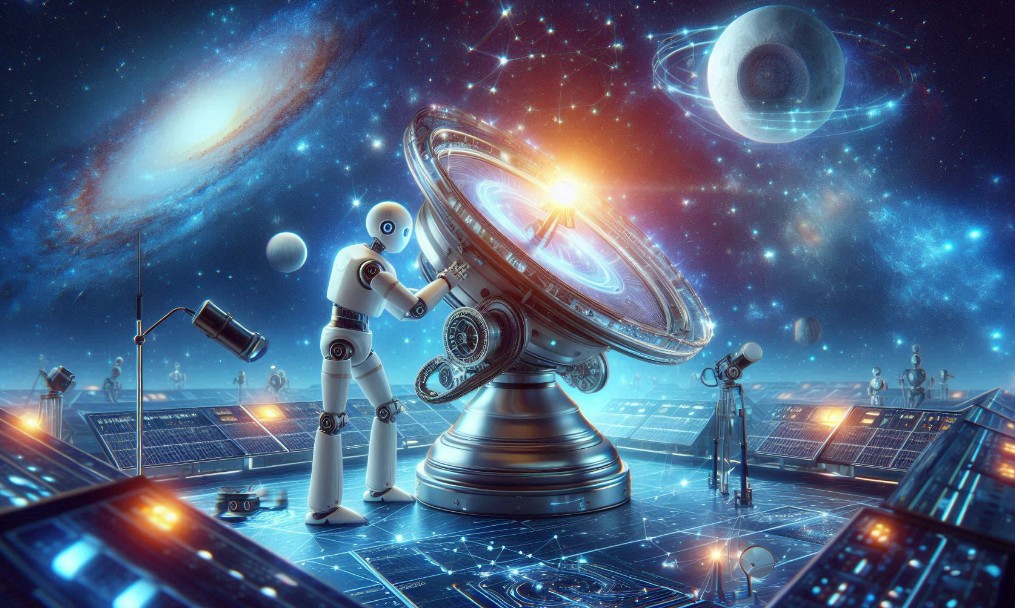In recent years, there has been a significant advancement in the field of Artificial Intelligence (AI) and Augmented Reality (AR). These technologies have become increasingly popular and have the potential to enhance virtual experiences in various fields such as gaming, education, healthcare, and...
AI in Astronomy How Robots Assist in Exploring Space

The intersection of cutting-edge technology and scientific inquiry is ushering in a new era for the study of the cosmos. Machines are increasingly being integrated into missions aimed at uncovering the mysteries of the universe. This shift is enabling a more precise and efficient approach to research beyond our planet.
Artificial intelligence and automated systems are now playing pivotal roles in collecting data, analyzing findings, and carrying out tasks that would have been unimaginable just a few decades ago. These advancements are transforming the way we perceive distant celestial bodies and phenomena.
With the use of sophisticated algorithms and machine learning models, tasks that were once time-consuming or dangerous for human involvement are now handled by intelligent systems. This development opens new doors for deepening our understanding of the farthest reaches of the cosmos while making missions safer and more cost-effective.
AI and the Future of Space Research
The role of intelligent systems in the ongoing pursuit of understanding the universe is becoming increasingly significant. These advanced technologies are making a substantial impact on the methods used to gather and analyze data, thereby reshaping the entire field. As artificial intelligence continues to evolve, its influence will expand, providing new opportunities for making groundbreaking discoveries.
Advancements in Data Processing
One of the key benefits of using AI in scientific research lies in its ability to process vast amounts of data at an unprecedented speed. Traditional methods of analyzing data from celestial bodies could take months or even years. However, with the help of machine learning, these tasks are now completed in a fraction of the time. AI systems are capable of:
- Quickly sorting through complex data sets
- Identifying patterns that might be invisible to human analysts
- Making predictions based on vast historical datasets
Improved Decision-Making and Efficiency
The future of scientific research beyond Earth relies heavily on automation and artificial intelligence to enhance the efficiency of missions. Intelligent systems can autonomously make decisions about the next steps during long-duration missions, reducing the need for constant human oversight. This leads to:
- More effective allocation of resources
- Faster response times to unexpected situations
- Enhanced operational safety during distant missions
As these technologies continue to mature, the possibilities for scientific achievements will expand, allowing researchers to reach new frontiers in understanding the universe with greater precision and less risk.

Robots Enhancing Space Missions Efficiency
Technological advancements in autonomous systems have significantly improved the operational efficiency of missions aimed at understanding the universe. These intelligent machines are designed to handle tasks traditionally carried out by humans, allowing for faster and more reliable outcomes. By integrating these systems into various phases of missions, efficiency has reached unprecedented levels, enabling teams to achieve more with less.
The integration of automated technology has brought numerous benefits, particularly in areas that require high precision and long-term monitoring. These systems are able to manage and execute tasks that are critical to the success of missions, reducing human error and optimizing performance.
Task Traditional Method Automated System Advantage
| Data Collection | Human-operated equipment, time-consuming | Continuous, autonomous data gathering with real-time analysis |
| Maintenance | Manual repairs, risk of failure | Self-diagnosing and autonomous maintenance with minimal human intervention |
| Navigation | Human-controlled, limited by communication delays | Autonomous navigation with instant decision-making capabilities |
By utilizing these intelligent systems, missions can operate more autonomously and with greater adaptability, increasing the likelihood of success in environments that are hazardous or difficult to access. These advancements mark a major step forward in the way scientific missions are conducted beyond Earth.
The Role of AI in Astronomical Discoveries
Artificial intelligence has become an essential tool in unlocking the secrets of the universe. Its ability to analyze vast amounts of data quickly and accurately is reshaping the way scientists make discoveries about distant phenomena. By using machine learning and other advanced algorithms, AI helps researchers identify patterns, detect anomalies, and predict future events in ways that were once impossible.
AI-driven technologies have enabled breakthroughs in understanding celestial objects, such as identifying new planets, mapping star systems, and detecting unusual cosmic events. These systems are capable of processing data from multiple sources, allowing for faster and more reliable analysis of complex signals and images.
In addition to identifying new celestial bodies, AI has also played a significant role in uncovering hidden patterns in existing data. By using deep learning techniques, AI can sift through large datasets to discover previously unnoticed correlations that lead to new insights about the universe.
Machine learning algorithms are increasingly employed to predict astronomical phenomena like supernovae, black holes, or cosmic rays. These predictions help scientists prepare for observations and guide the direction of future research. The power of AI lies in its ability to automate and enhance these processes, enabling astronomers to focus on interpreting results rather than manually handling data.



